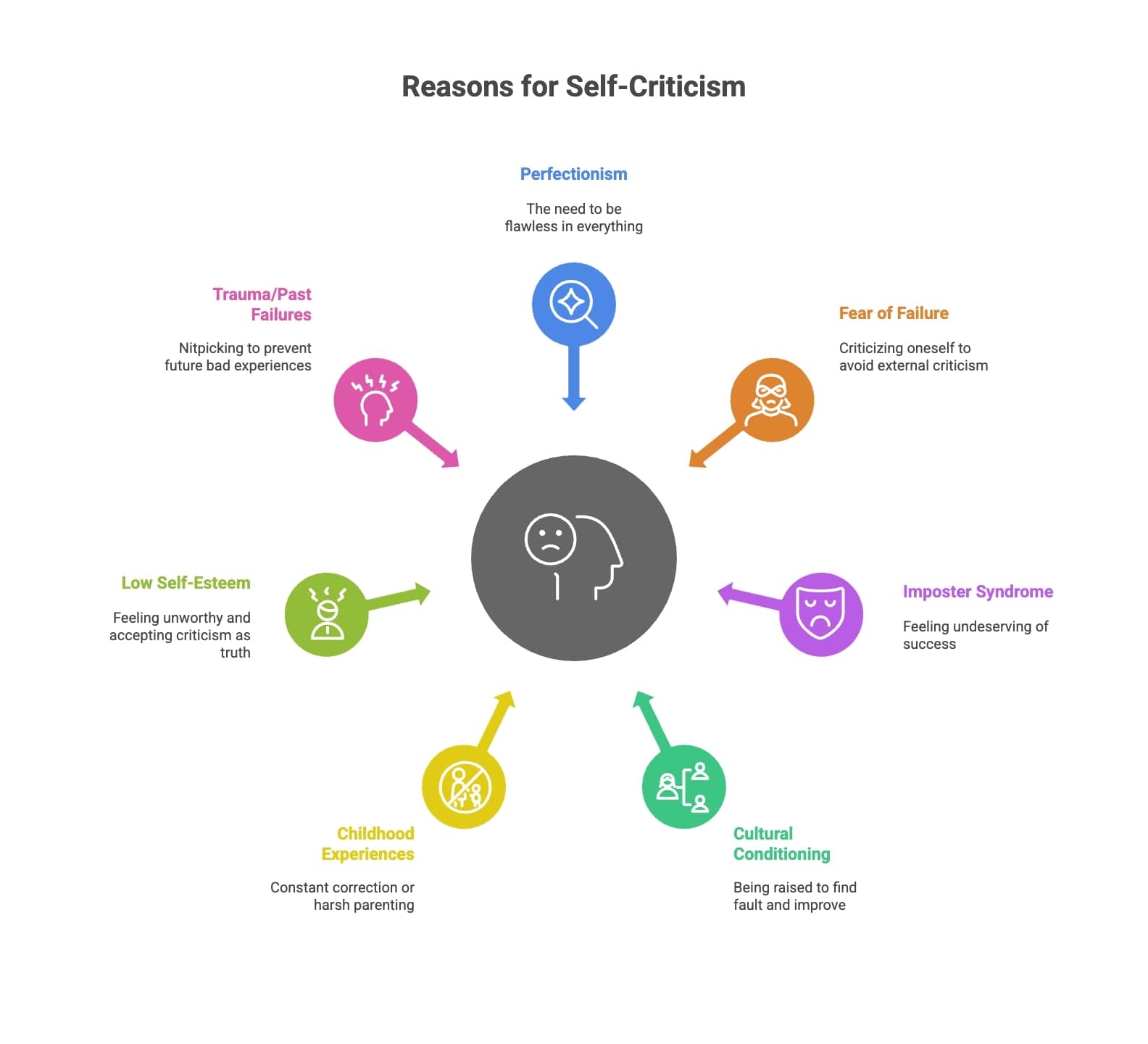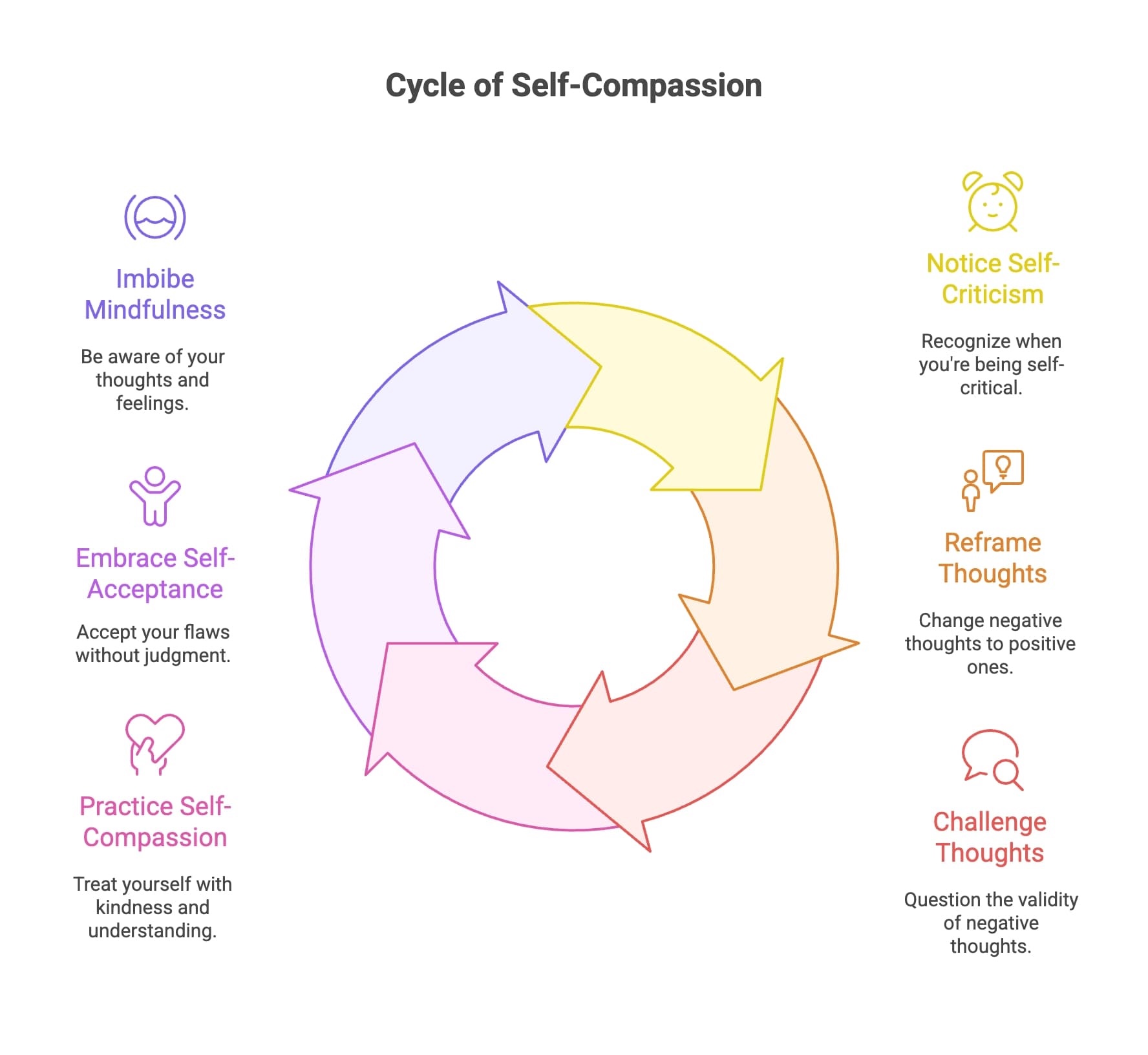Amaha / / / How to Stop Being Self-Critical: Breaking Free from Your Inner Critic
ARTICLE | 7 MINS READ
How to Stop Being Self-Critical: Breaking Free from Your Inner Critic
Published on
28th Jan 2026
ASMA THABASSUM
M.Phil In Clinical Psychology

Ever got frustrated with that constant chatter in your head? The one that whispers "you're not good enough" or "you messed up again"? Yeah, that's your inner critic. Clinicians at Amaha note that clients frequently engage in negative self-talk, with Indians being particularly susceptible due to our achievement-oriented culture and societal pressures.
Self-criticism is like having a prosecutor living in your head who never takes a day off. It's exhausting, counterproductive, and often stems from deep-seated patterns we've carried since childhood.
What is Self-Criticism Really?
Self-criticism is that harsh internal voice where you become your own worst judge. It's different from healthy self-reflection. Self-reflection is like having a gentle conversation with a friend about what went wrong, while self-criticism is more like getting scolded by that strict parent.
Self-criticism is the habit of evaluating yourself harshly. It shows up as that voice in your head that says:
- "You’re not trying hard enough."
- "Everyone else is doing better."
- "Why can’t you just be normal?"
Most of us don't even realize we're doing it. We've normalized this constant self-attack and self-deprecation mode.

Constant Negative Thoughts and Criticism affecting your Daily Life?
Speak to a Trusted Mental Health Professional and Understand How can you Stop it
Why do we keep criticising ourselves?
The roots of self-criticism run deep and often lead back to childhood. Maybe you had parents who meant well but constantly pointed out your shortcomings. Or perhaps you grew up in an environment where achievement was the only way to get approval. Most self-critical thoughts aren’t even yours originally. They’re learned.
Common reasons are:
- Perfectionism: The need to be flawless in everything
- Fear of failure: Better to criticize yourself first than let others do it
- Imposter syndrome: Feeling like you don't deserve your success
- Cultural conditioning: Being raised to always find fault and improve
- Childhood experiences: Constant correction, harsh parenting, or even being the "good kid" who got praised only for achievements.
- Low self-esteem: When you already feel unworthy, criticism feels like truth
- Trauma or past failures: If something bad happened, your brain tries to prevent it next time by nitpicking everything.
Most people don’t even realise they’re being self-critical. It feels normal and automatic.
Effect of self-criticism on self-esteem
A software engineer from Bangalore named Ranu recently joined a major tech company which was her dream job. Yet instead of celebrating this milestone, she kept second-guessing herself: “I probably just got lucky. They'll realise I'm not smart enough soon”.This constant self-criticism creates a vicious cycle. Self-esteem takes a hit, which makes one more prone to self-critical thoughts, which further damages confidence. People who engage in high levels of self-criticism show -
- lower confidence levels
- Increased anxiety and depression
- Difficulty making decisions
- Impaired performance at work or studies
Can self-criticism affect confidence?
Absolutely. It's like having a bully follow you around 24/7, except the bully is in your head and knows all your insecurities. When you constantly tell yourself you're not good enough, your brain starts believing it. Neural pathways strengthen with repetition, so every self-critical thought makes the next one easier. Before you know it, you're stuck in a pattern that feels impossible to break.

Is self-criticism a weakness?
Self-criticism isn't by itself bad or good. Some people think being hard on themselves will push them to excellence. In our competitive environment, from competitive exams to corporate ladders, we're taught that self-criticism equals ambition.
Healthy self-evaluation helps you grow. Toxic unhindered self-criticism? That's just self-sabotage. When you're constantly putting yourself down, you're not motivating yourself - you're paralysing yourself.
The science of why self-criticism happens
Your brain cannot distinguish between real and imagined negative events. When you criticise yourself, the amygdala (your brain's alarm system) triggers the same stress response as facing actual danger. This floods your system with cortisol, impairing memory and decision-making. Neuroimaging studies show that self-critical people have an overactive anterior cingulate cortex, the brain region associated with emotional pain.
And ironically, the more critical you are, the more this stress response keeps firing. It becomes a vicious loop. In fact, MRI studies have shown that chronic self-criticism activates the anterior cingulate cortex and dorsolateral prefrontal cortex regions linked to error detection and punishment.
Your brain becomes hyper-focused on what’s wrong with you. Over time, this increases the risk for anxiety, depression, and even physical symptoms like fatigue and insomnia.
On the other hand, when you practice self-compassion, other parts of the brain light up like the insula and oxytocin pathways associated with calm, connection, and healing. Your body literally begins to heal when you start being kinder to yourself. Self-compassion isn't just feel-good fluff. It’s a biological regulation.
How to deal with self-criticism
Practical Steps to Stop Self-Criticism
1. Nip it early: Start noticing when you're being self-critical. Set random alarms on your phone throughout the day and ask yourself: "What was I just thinking about myself?" You might be surprised how often you catch yourself mid-criticism.
2. Talk to yourself like your best friend: Would you talk to your best friend the way you talk to yourself? If your friend made the same mistake you did, would you call them stupid? Probably not. So why is it okay to treat yourself that way?
3. Rephrase your inner monologue: Instead of "I'm so stupid for making that mistake," try "I made a mistake, and that's human. What can I learn from this?"
4. Challenge your thoughts: When your inner critic starts up, ask:
- Is this thought actually true?
- What evidence do I have for and against it?
- What would I tell a friend in this situation?
5. Practice self-compassion: This isn't about becoming soft or lowering your standards. It's about treating yourself with the same kindness you'd show others. Self-compassion actually leads to better performance and resilience.
6. Embrace self-acceptance: Self-acceptance means acknowledging your flaws without judgment. It's not giving up on growth but accepting your humanity. This reduces the need for constant self-criticism.
7. Imbibe mindfulness Mindfulness can be a game-changer here. When you're aware of your thoughts, you can catch self-criticism before it spirals. When you notice self-critical thoughts, take a few deep breaths and say, "I notice I'm being hard on myself right now."
What to say to someone who's self-critical
If someone you care about is constantly putting themselves down, here's what helps:
- "Don’t tag the event as failure; instead, rephrase it as a learning experience"
- "You're being really hard on yourself"
- "What would you tell me if I made the same mistake?"
- "I believe in you, even when you don't believe in yourself"
How therapy can help
Sometimes, self-criticism can interfere with daily functioning, and you might need professional help. Cognitive Behavioural Therapy (CBT) is particularly effective for this. A therapist can help you:
- Identify thought patterns that might go unnoticed
- Develop healthier ways to evaluate yourself
- Work through the underlying issues that fuel self-criticism
- Build self-compassion skills
- Build unconditional self-esteem independent of outside events
Don't think of therapy as admitting failure. Think of it as getting a 3rd person perspective that will help you correct negative patterns that impact you over the long term.
Creating your anti-self-criticism toolkit
Daily Practices:
- Keep a ‘wins’ journal - write down one thing you did well each day
- Practice the "Stop, Look, Listen" technique when you catch yourself being self-critical. This starts with taking a pause, observing what’s happening inside, and gently listening to what you actually need in that moment.
- Set boundaries with your inner critic
Weekly Practices:
- Review your self-talk patterns
- Celebrate your progress, no matter how small
- Connect with supportive people who remind you of your worth
Monthly Practices:
- Assess your growth in self-compassion
- Adjust your strategies based on what's working
Final Thought: You are NOT your inner critic
Breaking free from self-criticism is not about becoming delusional or lowering your standards. It's about becoming your own cheerleader instead of your own enemy. It's about replacing that harsh inner critic with a supportive inner coach.
Change doesn't happen instantly. You've been practising self-criticism for years, maybe decades. Be patient with yourself as you learn new patterns. Every time you catch yourself being self-critical and choose compassion instead, you are rewiring your brain.
The goal isn't to eliminate the inner critic at one go but to reduce its power over you. You deserve the same kindness you give others. You deserve to be on your own team.

Frequently Asked Questions
Q1: How do I know if my self-criticism is healthy or toxic?
Healthy self-reflection helps you learn and grow without destroying your self-worth. Toxic self-criticism is harsh, repetitive, and leaves you feeling hopeless rather than motivated. If your inner dialogue sounds like a bully rather than a coach, it's probably toxic.
Q2: Can self-criticism actually motivate me to do better?
While some people believe harsh self-criticism drives success, research shows it actually impairs performance. Self-compassion and constructive self-evaluation are much more effective motivators. You can have high standards without being cruel to yourself.
Q3: How long does it take to stop being self-critical?
There's no fixed timeline since everyone's journey is different. Some people notice improvements in weeks, while others need months or years. The key is consistency in practising self-compassion and challenging negative thoughts. Remember, you're changing deeply ingrained patterns.
Q4: Is it normal to be more self-critical in certain situations?
Yes, absolutely. Most people are more self-critical during stressful times, when facing new challenges, or in areas where they feel insecure. Recognising these triggers can help you prepare better coping strategies for those situations.
Q5: Should I seek professional help for severe self-criticism?
If self-criticism is significantly impacting your daily life, relationships, work performance, or mental health, professional help can be very beneficial. Therapists can provide personalized strategies and help address underlying issues that fuel self-critical patterns.
Self-criticism meaning in Hindi :
आत्म-आलोचना का अर्थ है अपने आप को लगातार दोष देना, अपनी गलतियों पर कठोर निर्णय लेना और अपनी कमियों पर ध्यान केंद्रित करना। यह नकारात्मक विचारों का चक्र है जो आत्मविश्वास को नुकसान पहुंचाता है।Self-criticism का मतलब है खुद की गलतियों या कमियों को कठोरता से आंकना या खुद को बार-बार दोष देना। यह आत्म-सम्मान को कमजोर कर सकता है।